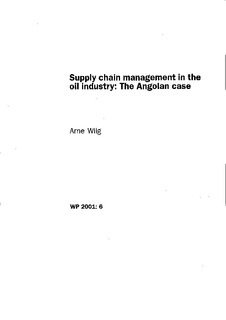| dc.contributor.author | Wiig, Arne | |
| dc.date.accessioned | 2008-02-27T09:50:24Z | |
| dc.date.accessioned | 2017-03-29T09:12:33Z | |
| dc.date.available | 2008-02-27T09:50:24Z | |
| dc.date.available | 2017-03-29T09:12:33Z | |
| dc.date.issued | 2001 | |
| dc.identifier.isbn | 82-90584-86-5 | |
| dc.identifier.issn | 0804-3639 | |
| dc.identifier.uri | http://hdl.handle.net/11250/2435865 | |
| dc.description.abstract | This paper focuses on the organisation of the supply chain in the offshore oil industry, primarily the relationships between upstream oil-companies and their main contractors. From studies of the North Sea offshore industry, we know that there are c10se ties between the upstream oil industry and its suppliers. From a transaction cost perspective, we analyse how the supply chains are organised in new and promising markets such as Angola where technology and trust differ from those of the North Sea. Tailor-made solutions in deepwater are generally more technically advanced and complex and require integrated solutions. The oil companies in Angola achieve such integration by using integrated oil service firms. We also observe that contracts are mainly based on market transactions between the supply industry and the oil companies. | |
| dc.language.iso | eng | |
| dc.publisher | Chr. Michelsen Institute | |
| dc.relation.ispartofseries | CMI Working paper | |
| dc.relation.ispartofseries | WP 2001: 6 | |
| dc.subject | Oil industry | |
| dc.subject | Supply chain | |
| dc.subject | Firm | |
| dc.subject | Property rights | |
| dc.subject | Economic theory | |
| dc.subject | Angola | |
| dc.title | Supply chain management in the oil industry: The Angolan case | |
| dc.type | Working paper | |
